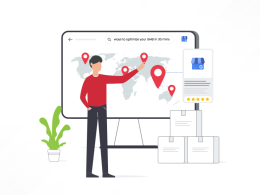Local SEO, or Local Search Engine Optimization, is an important strategy to make sure your business stands out in your geographical location. The main objective of local SEO is to optimize the virtual elements of your business, such as websites and business listings. This is useful for making sure that when local customers search for relevant products or services, the business appears prominently in search results.

The team of experts at OPositive uses this targeted approach for businesses not only to increase visibility but also to attract highly relevant traffic, offering a competitive edge in the local market. This is done with the help of focusing on local keywords, Google My Business optimization, and positive reviews. Local SEO helps businesses build trust and connect with their community, ultimately driving growth in the local market.
Understanding Local SEO
Local SEO means the process of optimizing a business’s online presence to increase the visibility of the business in local search results. The main motive behind it is to be more visible to nearby customers searching for products or services. This is what makes it crucial for businesses that operate within specific geographic areas. Local SEO involves various strategies, such as optimizing website content, managing business listings, obtaining positive reviews, and ensuring accurate business information across online platforms.
The significance of local SEO for local businesses can be judged by its ability to enhance visibility and attract targeted local traffic. Customers all over the world rely on online searches to find nearby products and services. This is what makes a robust local SEO strategy ensure that businesses appear prominently in local search results. It improves the chances of converting online searches into actual customers. This targeted approach is especially beneficial for brick-and-mortar stores and service-based businesses looking to connect with their local community.
Key Components of Local SEO Include:
Google My Business (GMB) Optimization: This practice involves claiming and optimizing your Google My Business profile. It is crucial for local SEO and involves offering accurate business information, such as name, address, phone number, business hours, and categories.
Local Citations: You need to make sure there is consistency in business information across online directories, local websites, and social platforms. It can improve local search visibility.
Local Keywords: You need to include location-based keywords in your website content, meta tags, and other elements. It helps search engines understand the geographic relevance of your business.
Customer Reviews: Positive reviews enhance your online reputation and contribute to local search ranking. Encourage satisfied customers to leave reviews on platforms like Google, Yelp, and others.
On-Page SEO: You should optimize your website’s content, meta tags, and headers with relevant local keywords. This helps search engines understand your business’s focus on a specific location.
Local Link Building: By building high-quality local backlinks from reputable websites, you can improve your local SEO. It means you should be getting links from local businesses, chambers of commerce, and community organizations.
Mobile Optimization: Mobile usage worldwide is steadily rising, which is why mobile search results are also rising. Ensure that your website is mobile-friendly for local SEO success.
By focusing on these elements, O Positive helps businesses enhance their visibility in local searches, attract nearby customers, drive more foot traffic to physical locations, or increase online visibility within a specific geographic area.
Difference Between Local And Traditional Seo
The difference between local and traditional SEO is in the scope and focus of the optimization efforts. Traditional SEO aims to improve a website’s overall visibility on a global or national scale, targeting a broader audience. On the other hand, local SEO is geographically focused, specifically targeting local searches within a specific area. Local SEO focuses on location-based keywords, Google My Business optimization, and local business listings. It is done to cater to the immediate needs of local customers. While traditional SEO strategies are essential for broader reach, local SEO is crucial for businesses seeking to establish a strong presence within their local markets.
Essential Local SEO Strategy
Google My Business (GMB) Optimization
You need to make sure your GMB profile is accurate and complete. It is the foundation of local SEO. This profile makes sure your business information is correct and readily available to users searching for products or services in your area. You can also add high-quality photos to showcase your offerings and create an inviting online presence.

Keyword Research with a Local Focus
The key to being discovered in local searches is targeting local keywords. You need to understand the terms your local audience uses when seeking products or services. Also, make sure to include city or neighborhood names in your keyword strategy. The utilization of tools like Google Keyword Planner, Google Trends, and local SEO platforms proves to be effective for keyword research.

On-Page SEO Elements for Local Ranking
This refers to including local keywords naturally into title tags, meta descriptions, and content. It helps search engines identify that your business is relevant to local searches. You should maintain consistency in your business’s Name, Address, and Phone Number across all online platforms. Consistent information enhances your local search presence.
Building Local Backlinks
To boost local visibility, you also need to gain backlinks from reputable local sources. Engage in local events, collaborations, or partnerships to naturally earn backlinks. Building relationships with other businesses and organizations can result in valuable local backlinks.
Leveraging Local Reviews
Reviews are great at making first impressions; you should request satisfied customers to leave positive reviews on platforms like GMB and Yelp. Monitor and respond promptly to both positive and negative reviews. Engaging with customer feedback demonstrates your commitment to customer satisfaction.
Local Content Marketing
You also need to focus on creating content that resonates with your local audience. This can involve Sharing information about local events, news, and community interests. Localized content enhances your relevance in local searches.
Mobile Optimization for Local Search
With the help of a mobile-friendly website, you can ensure a positive user experience, especially considering the rise in mobile searches. Prioritize responsive design, format content for readability on smaller screens, optimize the loading speed, and create touch-friendly navigation.
With the help of Opositive, you can not only implement these strategies but also regularly assess and adapt them to stay ahead in the dynamic landscape of local search optimization.
Advanced Local SEO Tactics
Utilizing Schema Markup for Local Businesses
The implementation of schema markup involves adding structured data to your website. This offers search engines with additional information about your content. For local businesses, this can include details such as business hours, reviews, and specific services offered.
Schema markup improves the rich snippets displayed in search results, making information about businesses more prominent. It enhances the chances of appearing in featured snippets and increases the relevance of your content to local searches.
Exploring Local SEO Opportunities with Voice Search
There is a steady rise in voice-activated devices worldwide, which is why optimizing for voice search is essential. You need to understand how users phrase voice queries and tailor your content to align with natural language patterns.
You should emphasize long-tail keywords and conversational phrases that users tend to use in local voice searches. Provide concise and direct answers to common local queries to increase visibility in voice search results.
Geo-Targeted Content and Landing Pages
Your website will also need specific landing pages tailored to different locations within your target area. These pages should contain localized content, testimonials, and offerings relevant to each location.
Geo-targeted pages improve your relevance for users searching in specific locations, improving your chances of appearing in local search results. This tactic also helps address the unique needs of diverse local audiences.
Advanced Local Link Building Strategies
You need to think above & beyond standard local backlink strategies by focusing on advanced techniques. Seek opportunities for guest posts, sponsorships, and collaborations with influential local entities. You should also create linkable assets such as in-depth local guides or resources.
Analyze the backlink profiles of your local competitors. Identify opportunities to acquire similar high-quality backlinks from relevant sources within your community.
Hyper-Local Social Media Engagement
Another thing you need to take care of is improvements in your social media strategy to target audiences within specific neighborhoods or communities. Share content that directly relates to local events, trends, and interests.
You can also connect with local social groups on platforms like Facebook or LinkedIn. Engage with community members, share valuable content, and build relationships within these hyper-local communities.
Local SEO for Multiple Locations
In case you own a business that has outlets/offices in multiple locations, make sure to implement strategies for each specific area. You can use location-based keywords, create dedicated GMB profiles for each location, and tailor content to the unique characteristics of each community. Another key consideration here is maintaining consistent business information across all locations and actively managing citations for each branch. This ensures accurate information and contributes to a cohesive online presence.
These are advanced local SEO tactics that go beyond the basics, offering businesses the opportunity to elevate their online visibility. It also helps them connect with their local audience on a deeper level. With the evolution of business norms, staying informed and implementing innovative strategies will contribute to success in local search optimization.
How to Measure Local SEO Success?
For the measurement of local SEO success, a business can use several key performance indicators (KPIs) to judge the impact of their efforts. Here are some important metrics and methods for evaluating local SEO performance:
Google My Business Insights
A very valuable resource in terms of KPIs of SEO is Google My Business (GMB). You can check the insights provided by the Google My Business (GMB) dashboard. This dashboard includes data on how many times your business appeared in local searches, the number of clicks to your website, and user actions like phone calls and direction requests. GMB insights can show direct feedback on how users are interacting with your business listing in local search results.
Local Search Rankings
You can review your business’s rankings in terms of relevant local keywords using tools like Google Search Console or third-party SEO tools. Improved rankings indicate that your local SEO efforts are helping your business appear higher in search results, making it more visible to potential customers.
Website Analytics
You can focus on organic search traffic from local sources when you analyze website traffic. You should look for increases in overall visits, time spent on site, and conversions. Positive changes in website metrics demonstrate that your local SEO strategies are driving more users to your site, and they’re finding value in your content.
Conversion Tracking
Tracking conversions is yet another KPI you should be monitoring. By setting up conversion tracking, you can measure specific user actions, such as form submissions, phone calls, or store visits that originated from local searches. With the help of conversion tracking local SEO efforts to actual business outcomes, showing how effectively your online presence is driving real-world results.
Local Backlink Analysis
The quantity and quality of local backlinks to your website can also be evaluated to better measure the success of local SEO. Tools like Moz or Ahrefs can provide insights into your backlink profile. A healthy backlink profile indicates that other local businesses or authoritative sources are endorsing and linking to your website, contributing to local SEO success.
Online Reputation Management
Monitoring online reviews on platforms like Google, Yelp, and others can help manage an online reputation. Track the number of reviews, overall ratings, and your responsiveness to customer feedback. Positive reviews and active engagement with customers contribute to a positive online reputation, influencing local search rankings and customer trust.
Local Citations
You should focus on auditing and managing your business citations across various online directories. It is crucial to maintain consistency in business information. Accurate and consistent citations contribute to local search visibility, making it easier for search engines to verify your business information.
Customer Engagement Metrics:
You can review customer engagement by analyzing social media engagement, including likes, shares, comments, and follows on platforms relevant to your business. Social signals can indirectly impact local SEO, and increased engagement may indicate a growing local audience and brand presence.
The Final Statement
Mastering local SEO is not just a trend but a necessity for businesses aiming to thrive in their local markets. If you optimize your Google My Business profile, incorporating local keywords, and engaging with your community through reviews and content, you can reach your goals. O+ helps you enhance your online visibility and attract more local customers. Along with regularly measuring your success through key metrics ensures that your efforts remain effective and aligned with the ever-evolving digital landscape. Join hands with us to harness the power of local SEO to stand out in local searches, connect with your audience, and drive meaningful results for your business.
FAQs
1. What is local SEO, and why is it important for businesses?
Local SEO, or Local Search Engine Optimization, is a strategy to help businesses show up in local online searches. It’s crucial because it makes it easier for people in your area to find and choose your business when they search for products or services.
2. How can I improve my business’s visibility on Google?
Claim and optimize your Google My Business (GMB) profile. Provide accurate information, add good photos, and encourage customers to leave reviews. This helps your business show up in local search results on Google.
3. What is the significance of using local keywords in my website content?
Using local keywords, like the name of your city or neighborhood, helps search engines understand that your business is relevant to local searches. It increases the chances of your business appearing when people in your area look for products or services.
4. How do I know if my local SEO efforts are working?
Monitor Google My Business insights, check your local search rankings, and analyze website traffic. Look for increases in clicks, conversions, and positive changes in metrics. This will help you determine whether your local SEO strategies are driving more people to your business.
5. Why are online reviews important for local SEO?
Online reviews on platforms like Google and Yelp impact how high your business shows up in local searches. Positive reviews and active engagement with customers contribute to a positive online reputation, which influences local search rankings and customer trust.











